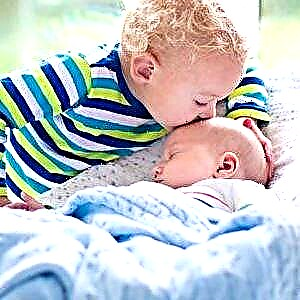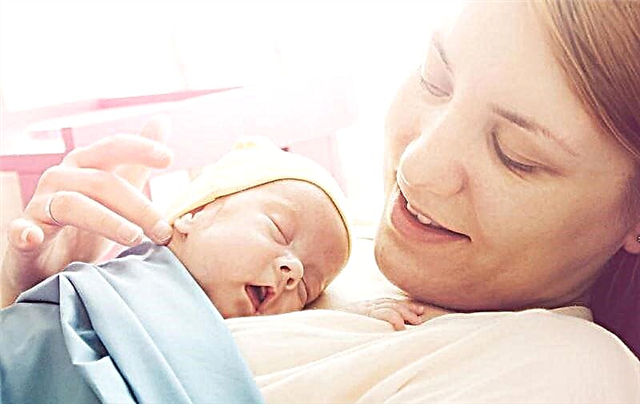The urgency of the problem
A study conducted in the Russian Federation in 2017 showed that there are more than 1.5 million families with several children in the state. This is almost a quarter more than in 2010, when the number of large family unions was about 1.2 million.
Three children in Russia are raised by 1,233,000 families, four by 233,000 families, five to seven by 95,000. Five thousand families have eight to ten children each, and 929 family unions have 11 or more children. Such data are indicated in the report of Deputy Labor Minister Alexei Vovchenko.
A lot or a little is a moot point. The main thing is that parents with many children raise more than 20% of the total number of children. Consequently, economic support from the state, social benefits and other incentives are extremely important for the normal functioning of these public institutions.
One can argue for a long time what led to an increase in the number of large families - an effective state policy (in the form of maternity capital) or simply a desire to see many happy children's faces around. The main thing is not this, families with several children need to be confident in the future, and knowledge of their rights and privileges will help create this confidence.
Which family is considered large?
In the legislation of the Russian Federation, the social status of a large family and measures of social support for this social phenomenon are established by Decree of the President of Russia No. 431, which was signed back in 1992 and supplemented in 2003.
There is no definition of large family unions in this legislative act. It was only noted that in Russia each subject independently establishes such a status for the provision of targeted assistance. This takes into account the degree of development of the region, national and cultural characteristics, the level of demography.
In Spanish legislation, there are 2 types of large family unions: ordinary - 3 or 4 children and special - 5 or more children.

In most constituent entities of the Russian Federation, according to the established practice, parents who have three or more children, whose age does not exceed 18 years, are considered to be large. Large families are also prescribed in the case of adoption, guardianship and guardianship.
As soon as one of the children turns 18 (if there were three of them in the family), then large families are removed from the family. However, in most regions, this status is extended until the onset of the 23rd birthday if an adult child receives full-time education at a university of any form.
Quite often, large family unions in Russian regions are assigned the status of poor, they also have certain privileges and rights.
Poor families include those families in which the income for each household is less than the subsistence level. However, when establishing the status, social security specialists first take into account how valid the reasons for such a low income are.
The family union is not recognized as poor if the adult members are able-bodied, but do not want to work due to alcohol or drug addiction.
When determining the status of a poor family union, the number of households and their income are taken into account. So, family members are parents, children (relatives or adopted), brothers and sisters, grandparents, grandchildren. The main condition is that they all live together and have a common household.
How to get the status of a large family?
The birth of a third child does not mean that parents will automatically become large. Such a status is granted only to those mothers and fathers who are engaged in the upbringing of children, take care of their health: physical and moral.
To get official recognition, a large family needs to meet certain conditions:
 It is necessary for the family to have a third child. However, in some regions of Russia, more children are required - at least four.
It is necessary for the family to have a third child. However, in some regions of Russia, more children are required - at least four.- Children in a family must not be adults. In most subjects of the Russian Federation, full-time students are recognized as members of large family unions until their 23rd birthday.
- Both parents who are officially married, a single mother or father, or the parent with whom the heirs live (if the spouses are divorced) can be recognized as having many children.
- If the family has moved to a permanent place of residence in another region of Russia, then the parents will have to re-register the status of large families. There are times when this privilege is denied to them due to the difference in the legislation of the subjects of the Federation.
In addition, the legislation also establishes some restrictions on obtaining the status of large families. So, when making a decision, children will not be taken into account:
- in respect of which the father and mother are deprived of parental rights or restricted in the legal regime;
- placed under the care of other people, since their parents shied away from their upbringing;
- who live off the state budget (for example, in a boarding school).
In order to obtain the status of a large family, as well as various benefits and allowances, a family union must be registered accordingly in social protection. How to do this and what documents are required to obtain the status, we will tell you further.
What documents are needed to obtain a status?
So, to consolidate the status of a family with a large number of children, parents need to contact the Department of Social Protection of the Population at the place of residence. You should also provide a complete package of documents, which is established by regional legislation.
The list of required documents includes:
 application for registration as a large family;
application for registration as a large family;- identification of parents (or one applicant);
- a child's birth certificate (for all children who are subject to registration for recognizing a family with many children; to obtain a child's birth certificate, you can contact the registry office);
- photographs of each parent measuring 3 by 4 centimeters (for registration of certificates);
- a certificate from the place of residence of all household members (if the children are registered in different places, these documents must be submitted separately for each child);
- a certificate from preschool and school institutions, a university about the education of children, which are taken into account for assigning the status of large families to a family;
- a document confirming the absence of the second parent, if the applicant is a mother or father;
- other documents that are established in the list of required papers in the legislative acts of a specific region of the Russian Federation.
Social security authorities do not have the right to demand from parents those documents that they themselves may request from state or municipal institutions.
Then, social security officers check the submitted documents, its term is regulated by regional law (usually does not exceed 30 days). If all the conditions for obtaining the status of large families are met, applicants are issued a certificate of a large family.
Payments to large families in 2018
Cash benefits in 2018 were indexed to the inflation rate. The organization of their payments, in comparison with previous years, has not changed.
Payments in connection with the birth of a child
When a baby is born in 2018, parents with many children will receive a one-time allowance. Its amount is fixed, that is, it will not depend on what kind of child it is in the family: the third or the next. If twins or triplets are born, the allowance will be paid for each newborn.

The amount of a one-time allowance for large families in 2018 for the birth of a third child in a large family is 20,999 rubles. 54 kopecks; one-time allowance for the birth of the fourth and subsequent children - 27 thousand 999 rubles. 40 kopecks. In addition, the amount increases by the regional coefficient, which is set in some regions of the country. That is, in the Volgograd region and in the Far North, the amounts will differ.
If a baby is adopted by a large family, then the parents receive the same amount that they would receive after the birth of their own child. The payout will increase many times over if adopted:
- a child with a disability;
- child over 7 years old;
- brothers / sisters.
Child support payments
Monthly cash aid for large families in 2018 is the average childcare allowance. Up to the age of one and a half years, every parent who is raising a child receives it.
If one child is brought up in a family, then the size is 40% of the average salary. If the family has three or more children of this age, then the parent will receive 100% of the average earnings.
If the family is recognized as poor (the average per capita income does not reach the subsistence level), then up to the age of 16, parents will be paid a monthly allowance for each child.
To get it, you need to contact the Social Security Department, providing birth certificates for children, a certificate from the place of residence and information about income for the last quarter. If the child is already 16 years old, you will have to take a certificate from the school.
The amount of such payment is calculated by the authorities of the subjects of the Federation. Consequently, in the Moscow region it will be different than, say, in Mari El. Usually the allowance is small - about 1,500 rubles. If the parent is raising the children alone, the amount may be increased.
Benefits for the third child
The state budget for 2018 is formed in such a way as to take into account payments for the second, third child and subsequent babies. A large family in 2018 can receive the so-called maternity capital, provided that it was not received at the birth of the second child.
 Ordinary and large families in 2018 can receive family capital in the amount of 453,026 rubles. To issue a certificate, you must submit a number of documents to the Pension Fund of the Russian Federation.
Ordinary and large families in 2018 can receive family capital in the amount of 453,026 rubles. To issue a certificate, you must submit a number of documents to the Pension Fund of the Russian Federation.
In some regions of Russia, at the birth of a third child and subsequent children, a very significant amount may also be due. So, in Bashkiria, the size of the regional maternity capital (it is simply called a one-time benefit) for each adopted child (this is important) is the same amount - 453,026 rubles.
Thus, the authorities of Bashkortostan are encouraging citizens to take orphans into their families. If large families decide to take a disabled child, the amount will increase by another 100,000 rubles. There is a specificity in local maternity capital in other regions.
Additionally, in 69 regions with low fertility, monthly allowances in the amount of the subsistence level are paid for the third and subsequent child.
To receive such cash payments, parents must meet certain conditions:
- The applicants are registered at their place of residence in the region of the Russian Federation, which is included in the list of Russian subjects with low fertility. This list is annually updated and approved by members of the government.
- The child (third or subsequent) must be born after December 31, 2012 or adopted after December 31, 2015. In those entities that joined the payment program later, completely different initial dates will be set.
- The family's average per capita income does not exceed the subsistence level, which is established in a particular constituent entity of the Russian Federation. That is, the registration will take place after the need for state support is established.
These payments will be carried out in a strictly defined period: from the moment the first documents of a newborn or adopted child are drawn up, until they reach the age of three. Then the benefit is canceled.
State awards
In addition to the material payments discussed above, which are provided to families with many children in the form of one-time or monthly benefits, as well as one-time subsidies, one more monetary reward for parents is possible - state and regional awards.
Thus, in 2008, the Order of Parental Glory was established by the Decree of the President of the Russian Federation. They are awarded to parents with many children, with a lump sum payment of 100,000 rubles.
 In this case, there are two options for awarding:
In this case, there are two options for awarding:
- both the mother and the father with many children (adoptive parents) who are officially married are awarded;
- either the father or the mother is awarded if the family is incomplete.
To receive this order, certain conditions must be met:
- parents with many children have seven children who are citizens of the Russian Federation;
- reward parents only after the seventh child turns three;
- rewarding is still done if one of the seven children died while protecting the Fatherland and its interests;
- the family provides decent care and upbringing to all children for 5 years.
Also, regional budgets provide for payments to those parents who have been awarded the Federal Order of Parental Glory. For example, the Kurgan authorities give one-time encouragement to parents with a payment of 50,000 rubles.
In addition, in the same Kurgan region, one-time cash payments are additionally established. For example, they are given to mothers who are awarded the Maternal Glory badge. For the badge of the first degree, women receive 100,000 rubles, for the second degree - 50,000 rubles, for the third - 25,000 rubles.
Thus, for large families in 2018 there is a chance to receive a state and / or regional award - an order or badge of honor. You can find out more about these opportunities at your local Social Welfare Office.
Cash benefits and compensation
Back in 1992, the minimum federal standards for various benefits for parents with many children were drawn up. Such a benefit is monetary compensation, or relief, which is available in all regions of the Russian Federation.
Every large family has the right to:
 discounts when paying for state and municipal services;
discounts when paying for state and municipal services;- tax deductions;
- subsidizing the construction of housing and the purchase of building materials by parents with many children in the form of loan guarantees, grants and soft loans;
- improving the conditions for providing pensions and increasing the size of the pension.
It should be understood that federal standards do not consider specific mechanisms for the implementation of the above areas. Therefore, benefits and compensations are additionally established by various legislative acts of federal, regional and municipal significance.
Housing and utility benefits
Families with many children receive a 30% or 50% discount (in the Republic of Crimea) on payments for services such as:
- communal needs - families with several children pay less for heating, water supply, drainage of sewage water, electricity, natural gas;
- purchasing fuel - large families living in premises that do not have centralized heating pay less for coal or firewood.
Today, commercial housing management companies provide significant amounts of public services to the population. For this reason, as well as due to imperfect local legislation, such benefits are often not implemented in practice.

Today the Federal Law (federal laws) and local regulations do not provide for a situation when commercial management companies provide benefits at the expense of their own finances.Perhaps, in the future, compensation of costs will be carried out in the form of co-financing.
Many constituent entities of the Russian Federation also have programs to subsidize the expenses of large family unions for the purchase or construction of housing:
- social payments (subsidies) for the purchase of housing;
- preferential mortgages in the largest and most reliable domestic banks (Sberbank, VTB24). Regional authorities participate in such programs.
Most often, such benefits are intended only for those families that are registered as in need of better housing conditions.
Tax incentives
When asked what benefits are provided to families with many children, a very specific answer is given - tax benefits. The Russian tax code provides for a deduction for personal income tax on children. This deduction is provided to parents with many children who are raising children under 18 years old (up to 24 years old if the child is full-time).
 Amount of tax deductions:
Amount of tax deductions:
- 1,400 rubles - for the first and second child;
- 3,000 rubles - for the third and subsequent children, for a child with a disability, regardless of the order of birth.
Preferential deductions apply to the child's parents, foster parents and guardians. Of course, the benefits are not automatically granted, so the family will have to apply for a tax deduction.
You should be aware of some important nuances of obtaining tax benefits for families with several children:
- the deduction is due to each parent who is officially employed;
- the list of those who can receive deductions includes divorced spouses who pay child support or otherwise provide for the children;
- if the adoptive father or mother waives the benefit, the deduction due is transferred in full to the other parent.
Tax deductions are only due to families whose income does not exceed the national average. That is, the preferential taxation will remain in effect until the amount of the received deduction exceeds 280,000 rubles.
Pension benefits
In large families, mothers have the right to retire early on an old age pension at the age of 50 and in the case of 15 years of insurance experience. To do this, you must fulfill 2 main conditions:
 the woman gave birth (or adopted) five or more children;
the woman gave birth (or adopted) five or more children;- the woman brought them up to at least 8 years of age.
In addition, since the beginning of 2015, in accordance with the updated pension legislation, points (coefficients) are additionally awarded for children, adding up which, the mother will be able to significantly increase the size of the insurance pension contribution.
Number of points:
- 1.8 points per maternity year - for the first child;
- 3.6 odds - for the second child;
- 5.4 coefficients - for the third child and subsequent children.
Depending on how many children the woman gave birth to and raised, a pension will be charged. Of course, in this case, pension contributions will be higher than with standard income to the Pension Fund of the Russian Federation.
Also, in the Orenburg region and other constituent entities of the Russian Federation, regional pension benefits are established, which represent compensatory increases in pension. All together will give quite an impressive amount.
Solving housing problems
In 2011, the Land Code was amended to establish the right of families with several children to receive free land plots owned by the state or municipality. The parents' goal may also be to build their own home.
In 2015, changes were made to the Land Code again, as a result of which new procedures were established for the transfer of land plots to the ownership of large families.

Important additions
New additions and changes also apply to the rights of families with three or more children. The previously existing right to receive a land plot for free has been preserved, but 2 serious additions have appeared:
- Now, in order to consider the benefits for large families and to issue the necessary land plot, the authorities are not enough just to have three or more minor children. Another requirement is that the family must be registered with the local administration as in need of better housing conditions.
- Regional authorities can also offer families with a large number of children an alternative - instead of a free piece of land, providing housing. Several alternatives are possible:
- transfer of free social housing (apartment or private house) to the ownership of the family;
- allocation of living space on social rent terms;
- a state payment for the partial repayment of the cost of an apartment, which is acquired by a family independently on commercial terms (this can be a mortgage).
Land plots can be provided to families with many children for various purposes: building a dwelling house or summer cottage, breeding animals, setting up a vegetable garden or garden, farming, and others. Parents must independently choose a certain type of land use.
Free land on the municipal territory is issued to a large family only once. The taken plot can be sold by the owners, or they can start building on them. If the land is not satisfactory for any parameters, they refuse it. But a large family will again have to register and wait for a positive decision.
Required documents
An approximate list of papers that are required to obtain a plot of land for parents with many children, as follows:
 birth certificates of all children (duplicates);
birth certificates of all children (duplicates);- marriage certificate (duplicate);
- extract from the house book;
- help that demonstrates the composition of the family;
- IDs of each parent (copies).
If there are adopted children in a large family, copies of papers must also be submitted, which would indicate the adoption of each family member who has not reached the age of majority. In addition, you should receive a certificate from the guardianship and guardianship authorities, which would confirm that this very adoption is still valid.
After that, local governments must make a decision on registering the family or refusing this action. Usually the review process takes 30 days, but in some regions the authorities can handle it in a few days.
If the decision is positive, the large family will be assigned a certain serial number and put in a queue. Usually, during the year, parents and children become the happy owners of a land plot.
As a conclusion
Thus, in most regions of Russia, families with three or more children under the age of 18 are considered to have many children. Benefits and allowances for large families significantly improve the quality of their life, since they operate in several directions at once:
- monetary compensation (payment, benefits, etc.);
- preferential admission to kindergarten;
- pension benefits;
- housing and communal benefits;
- improvement of living conditions;
- state awards.
Of course, such state support is a good help, however, numerous social risks prevent many families from having as many children as they would like. Perhaps in the future, despite any crises, the number of large families in our country will only increase.

 It is necessary for the family to have a third child. However, in some regions of Russia, more children are required - at least four.
It is necessary for the family to have a third child. However, in some regions of Russia, more children are required - at least four. application for registration as a large family;
application for registration as a large family; discounts when paying for state and municipal services;
discounts when paying for state and municipal services; the woman gave birth (or adopted) five or more children;
the woman gave birth (or adopted) five or more children; birth certificates of all children (duplicates);
birth certificates of all children (duplicates);

